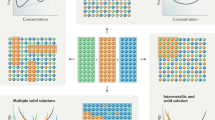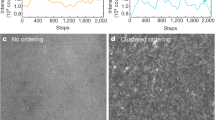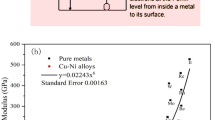Abstract
1/1, 3/2, 5/3, 7/4, 9/5, 11/6, 13/7 ... (2n – 1)/n ... 2/1 is a monotonic sequence1 tending to the limiting value 2/1 when n is increased indefinitely. This sequence is a systematic representation of the ratio of the number of free valency electrons to atoms in the well-known Hume-Rothery2 series of electronic compounds.
This is a preview of subscription content, access via your institution
Access options
Subscribe to this journal
Receive 51 print issues and online access
$199.00 per year
only $3.90 per issue
Buy this article
- Purchase on Springer Link
- Instant access to full article PDF
Prices may be subject to local taxes which are calculated during checkout
Similar content being viewed by others
References
Bromwich, T. J. I'a., "The Theory of Infinite Series" (London: Macmillan and Co., Ltd.).
Hume-Rothery, W., "The Structure of Metals and Alloys" (Institute of Metals).
Mott, N. F., and Jones, H., "The Theory of the Properties of Metals and Alloys" (Oxford: Clarendon Press).
Bradley, A. J., and Hones, P., J. Inst. Metals, 51, 131 (1933).
Bradley, A. J., Lipson, H., and Goldschmidt, H. J., J. Inst. Metals, 63, 149 (1938).
Konobeevsky, S., J. Inst. Metals, 63, 161 (1938).
Author information
Authors and Affiliations
Rights and permissions
About this article
Cite this article
BRADLEY, A. Electron–Atom Ratios in Alloy Phases as a Monotonic Sequence. Nature 163, 683–684 (1949). https://doi.org/10.1038/163683a0
Issue Date:
DOI: https://doi.org/10.1038/163683a0
This article is cited by
-
Resource availability through rainwater harvesting influenced vegetation diversity and herbage yield in hillslope of Aravalli in India
Frontiers of Agriculture in China (2010)
-
Structure of Cu32Al19
Nature (1951)
Comments
By submitting a comment you agree to abide by our Terms and Community Guidelines. If you find something abusive or that does not comply with our terms or guidelines please flag it as inappropriate.



